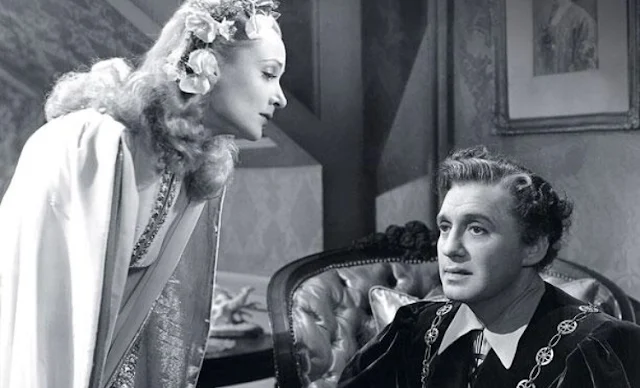 |
| Gary Cooper, Marlene Dietrich, John Halliday in Desire |
Tom Bradley: Gary Cooper
Carlos Margoli: John Halliday
Mr. Gibson: William Frawley
Aristide Duvalle: Ernest Cossart
Avilia: Akim Tamiroff
Dr. Maurice Pauquet: Alan Mowbray
Aunt Olga: Zeffie Tilbury
Director: Frank Borzage
Screenplay: Edwin Justus Mayer, Waldemar Young, Samuel Hoffenstein
Based on a play by Hans Székely and Robert A. Stemmle
Cinematography: Charles Lang
Art direction: Hans Dreier, Robert Usher
Film editing: William Shea
Costume design: Travis Banton
Music: Friedrich Hollaender
Frank Borzage's Desire was one of the first films Marlene Dietrich made after she and Josef von Sternberg went their separate ways. Though she's still very much in the Sternberg mode in her makeup, her consciousness of the way she's being lighted, and the couture by Travis Banton, she's also softer, funnier, and more human. She also benefits from being re-teamed with Gary Cooper, her co-star in Sternberg's Morocco (1930), and the only leading man with whom she had any real chemistry in the Sternberg films. Desire is still glamorous nonsense, a romantic comedy in which Dietrich plays a jewel thief and Cooper a seemingly naïve American automotive engineer. They meet on the road to Spain, where Cooper's Tom Bradley plans to spend his vacation and Dietrich's Madeleine de Beaupre is meeting up with her accomplice, Carlos Margoli -- a part planned for John Gilbert that went to John Halliday after Gilbert suffered a heart attack. Cooper is delightful as the infatuated American, whose native shrewdness manifests itself eventually. A subtext about the unsettled situation in Europe runs through the film, though there's no direct reference to the civil war brewing in Spain. Tom Bradley is not one to be outwitted by Europeans like Carlos, who, in a conversation about whether the United States would get involved if war breaks out in Europe, observes, "America's a very large country." Tom replies, "Six feet three." Like most good romantic comedies, Desire gets the best out of its supporting players, including Ernest Cossart as the jeweler and Alan Mowbray as the neurologist whom Madeleine plays off against each other to get her hands on the loot, Akim Tamiroff as a police officer, and Zeffie Tilbury as the larcenous, tippling Aunt Olga. Ernst Lubitsch, who produced, also directed some scenes while Borzage was finishing up another film, and his celebrated touch gives Desire some of its vivacity.

